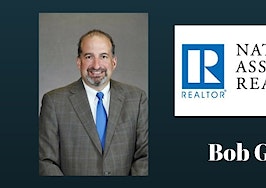- The bill NAR opposes would eliminate grandfathering and tweak flood mapping in a way that NAR said would unfairly burden homeowners by making them responsible for providing elevation data.
- The association supports other tweaks to the program, such as establishing a $10,000 rate cap, removing barriers for the private market and developing plans for mitigating loss.
What do you do when the House Financial Services Committee is working on seven bills that reauthorize and tweak the National Flood Insurance Program (NFIP) — and you agree with six of the seven?
If you’re the National Association of Realtors (NAR), you put together a letter outlining exactly where the legislation hits the mark (and where it misses), and you send it off.
The committee approved the bills last week, and NAR President William E. Brown said in a statement released last Friday, when the legislation markup concluded, that he hoped the issues with the bills would be addressed as it winds its way through the House and Senate.
What’s the NFIP?
The NFIP has been around since 1968. The program makes flood insurance available to property owners in “Special Flood Hazard Areas” where insurance companies might not otherwise offer it. NAR made NFIP reauthorization and reform one of its legislative talking points this year.
Even though it’s been law for almost 50 years, the NFIP has gone through some shifts. Most recently, in 2014, the Homeowner Flood Insurance Affordability Act reinstated grandfathering of lower rates and changed the process for subsidizing premiums.
What does the new set of bills change?
The new legislation would exempt commercial property owners from purchasing flood insurance for properties in “Special Flood Hazard Areas.”
The bill that NAR opposes would eliminate “all future grandfathering for existing homeowners who have followed the law, built to code and invested tens of thousands of dollars to reduce their risk, as well as NFIP’s exposure.”
The association also says that the flood mapping reforms don’t “go far enough. FEMA must obtain the elevation data necessary to calculate and disclose full risk rates for all homes in the NFIP by transitioning to building-specific flood maps like North Carolina’s….
“It should not be incumbent on homeowners to spend hundreds of dollars to provide information that a federal program funded by their tax dollars should be collecting in the first place,” Brown added in the letter.
“Finally, NAR is very concerned about the cumulative impact of the bill’s new surcharges and fee increases on the total cost of flood insurance; additional analysis is needed to evaluate the cumulative impact of the collective changes for a range of policyholders,” he wrote.
Other changes would:
- Establish an NFIP rate cap of $10,000 per year — NAR supports this but wants to remove a requirement that homeowners file a valid elevation certificate in the previous calendar year to access the rate cap.
- “Remove barriers to private flood insurance while keeping NFIP viable” — NAR supports this.
- Set standards for communities to develop their own flood maps and clarify the opt-out provision so it applies “only to large commercial portfolios where many buildings could be covered by one private market flood insurance policy.” — NAR supports this.
- Develop plans for mitigating repetitive loss — NAR supports this.
- Requiring the Federal Emergency Management Administration (FEMA) to use replacement cost values for individual structures instead of a national average — NAR supports this.
- Double the amount of increased-cost-of-compliance (ICC) coverage and “allow homeowners access to mitigate their property before it floods” — NAR supports this.
“Congress has less than four months to reform and reauthorize the critical National Flood Insurance Program,” wrote Brown in last Friday’s statement. “NAR is pleased that Congress is addressing the issue.
“Reauthorization remains our top priority,” he continued. “Our Realtor members know firsthand that this program is critical for the 22,000 communities that depend on it. Homeowners everywhere are counting on us to get this right.
“Chairmen Hensarling (R-Texas) and Duffy (R-Wis.) and members of the House are to be commended for their attention to this issue. We look forward to working with them to improve the 21st Century Flood Reform Act as it works its way through the legislative process,” Brown concluded.












